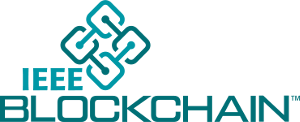IEEE Blockchain eLearning Modules
The IEEE Blockchain Initiative offers a series of online eLearning modules on Blockchain. Learn from the experts about how this emerging technology will offer a new way of conducting transactions, securing networks, and recording the validity and origin of data. Courses will cover a range of topics, including the fundamentals of Blockchain, key technologies, architecture, potential applicatons, benefits, challenges, and more. Participants also have the opportunity to earn Continuing Education Units (CEUs) and Professional Development Hours (PDHs) with each course.
Available courses:
- A Step-by-Step Approach to Designing Blockchain Solutions
- Designing Blockchain Solutions: Making the Case
- Designing Blockchain Solutions: Defining Functional Requirements
- Designing Blockchain Solutions: Defining Non-Functional Requirements
- Designing Blockchain Solutions: Selecting the Platform
- Designing Blockchain Solutions: Implementing the Solution
- Introduction to Blockchain Technology
- Introduction to Ethics of Blockchain Technology
- Responsible Research and Innovation of Blockchain Technology
- Case Studies of Social and Ethical Impacts of Blockchain Technology
- Blockchain Governance and Human Rights
A Step-by-Step Approach to Designing Blockchain Solutions
Length: 5 hrs | Earn 5 PDHs / 0.5 CEUs
This course program offers practical guidance for how to design a blockchain solution. Learners can expect to get a recap of the basics of the technology; understand the expected benefits of a blockchain solution; be able to explain how a solution would benefit a prospect company; be able to design or propose new solutions; understand the expected costs of a solution; understand the resources that are required to develop a solution; be able to write a development brief and draft project proposal. This program builds on other Blockchain-related courses available through IEEE.
Access course program at the IEEE Learning Network
This course program consists of:
Designing Blockchain Solutions: Making the Case
Length: 1 hr | Earn 1 PDH / 0.1 CEU

Is a blockchain solution the right way to go? For companies making the case for or against a blockchain solution, three key steps are required: strategic assessment, opportunity assessment, and a readiness assessment. This course provides a template with examples for learners to use and populate in order to come up with their own conclusions.
Access this course at the IEEE Learning Network
Designing Blockchain Solutions: Defining Functional Requirements
Length: 1 hr | Earn 1 PDH / 0.1 CEU

Much of the power of blockchain solutions comes from the technology that enables collaboration across a wide range of participants. This course offers a step-by-step solution to the challenge of blockchain. Learners consider the goals and motivations of all parties involved. This is accomplished by defining the blockchain ecosystem, specifying functional and performance requirements, and determining governance requirements.
Access this course at the IEEE Learning Network
Designing Blockchain Solutions: Defining Non-Functional Requirements
Length: 1 hr | Earn 1 PDH / 0.1 CEU

In this course the goal is to define the non-functional requirements necessary for development of a blockchain solution. The course begins by defining the types and the role non-functional requirements play in designing a blockchain solution. Learners will focus on six categories of non-functional requirements and what those categories mean across the different levels of the architecture. The course will showcase a representative architecture for framing non-functional requirements and provides four use cases and tips when defining non-functional requirements for a specific project.
Access this course at the IEEE Learning Network
Designing Blockchain Solutions: Selecting the Platform
Length: 1 hr | Earn 1 PDH / 0.1 CEU

This course will help learners select the technologies that will help successfully implement a blockchain solution. Today, there are many providers advertising blockchain solutions. These companies promise to deliver technology platforms needed to build and implement particular solutions. To help select those technologies, this course highlights three things needed to implement a blockchain solution, focuses on key platform considerations, examines the available top platforms and their characteristics, and finally reviews steps for selecting the best platform for your blockchain solution.
Access this course at the IEEE Learning Network
Designing Blockchain Solutions: Implementing the Solution
Length: 1 hr | Earn 1 PDH / 0.1 CEU

Once learners reach the point where the blockchain solution has been designed, all the required features have been selected, and an appropriate platform has been chosen it is time to begin implementation. Only proper implementation will drive the creation of a brand-new ecosystem that can provide benefits for all those involved. This course will guide learners through seven barriers that need to be successfully navigated and provide a simple five-step process that will ensure success.
Access this course at the IEEE Learning Network
About the Instructor:
 Dr. Hunter Albright is a faculty member at the University of Colorado, Boulder, and teaches at the Leeds School of Business and the School of Engineering. As the executive director of the university’s blockchain alliance, he is leading the research, application, and education of blockchain technology and solutions. He is a member of the C4’s Certified Bitcoin Professional Advisory Board and supports the IEEE’s blockchain efforts as the co-chair the of IEEE Blockchain Education Initiative and co-chair of the IEEE Blockchain for Transactive Energy Initiative.
Dr. Hunter Albright is a faculty member at the University of Colorado, Boulder, and teaches at the Leeds School of Business and the School of Engineering. As the executive director of the university’s blockchain alliance, he is leading the research, application, and education of blockchain technology and solutions. He is a member of the C4’s Certified Bitcoin Professional Advisory Board and supports the IEEE’s blockchain efforts as the co-chair the of IEEE Blockchain Education Initiative and co-chair of the IEEE Blockchain for Transactive Energy Initiative.
Blockchain & Ethics
Introduction to Blockchain Technology
Length: 45 min | Earn 1 PDH / 0.1 CEUs
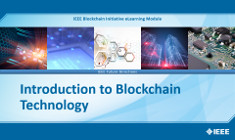
This module lays the groundwork for understanding blockchain technology. It will offer a low-level entry into the technology, by discussing its origins, its key technological features and its different potential applications. Central features such as wallets and transactions will be discussed and crucial notions such as hashes, blocks and chains will be explained. After completing this module, participants will have:
A basic understanding of the origins and the key technological aspects of blockchain technology
A basic understanding of different architectures and myriad potential applications of blockchain technologies
Access this course at the IEEE Learning Network
Introduction to Ethics of Blockchain Technology
Length: 40 min | Earn 1 PDH / 0.1 CEUs
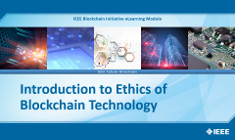
This module provides an overview of approaches in normative ethics that can be used to evaluate blockchain technologies. Participants will be made familiar with consequentialism, deontology, virtue ethics and care ethics. Furthermore, a simple method for constructing an ethical case study is presented and explained. After completing this module, participants will have:
A basic understanding of the main approaches in normative ethics
A basic understanding of ways to apply these approaches to evaluate blockchain technologies
The basic skills for constructing an ethical “case study” involving a blockchain technology
Access this course at the IEEE Learning Network
Responsible Research and Innovation of Blockchain Technology
Length: 45 min | Earn 1 PDH / 0.1 CEUs
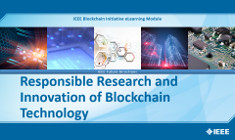
This module links the ethical evaluation of blockchain technologies with contemporary approaches in applied ethics that focus on responsible research and innovation. It provides an overview of the current state of the art of these approaches and discusses their possible applications in the context of blockchain technologies. Furthermore, it zooms in on approaches used in recent literature that investigate the social and ethical impacts of blockchain technology. After completing this module, participants will have:
A basic understanding of contemporary approaches in applied ethics dealing with emerging technologies such as blockchain technologies
An understanding of some contemporary, “state of the art” discussions on the ethical and social impacts of blockchain technologies
Access this course at the IEEE Learning Network
Case Studies of Social and Ethical Impacts of Blockchain Technology
Length: 45 min | Earn 1 PDH / 0.1 CEUs

This module offers several practical case studies on the development and application of blockchain technologies, analysed to highlight their social and ethical impacts. These case studies helped shape the narrative and normative framing of blockchain technologies within their communities, and consequently public discourse. By analysing the ethical issues and controversies that arose in these case studies, the complex terrain of ethical decision-making in the development and application of blockchain technologies will be made explicit. After completing this module, participants will have in-depth knowledge of the social and ethical impacts of the following case studies:
Wikileaks and the early adoption of Bitcoin to circumvent state control
The ethical risks of designing a blockchain social networking service
The ethical risks of teaching and practicing blockchain cybersecurity
Access this course at the IEEE Learning Network
Blockchain Governance and Human Rights
Length: 45 min | Earn 1 PDH / 0.1 CEUs
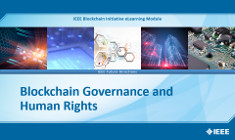
This module provides ways to think about how the architecture of blockchain technologies shapes governance processes and the forging and maintenance of a legal system. Similar to the Internet, blockchain technologies challenge our ideas about the relation between technology, governance, and the rule of law. Blockchain-based systems could potentially impact human rights provisions such as the right to nationality and to privacy. After completing this module, participants will have gained insight into:
The relation between blockchain technologies, governance, and the rule of law
The potential impact of blockchain technologies on the human rights of nationality and privacy
The overall findings of the five modules of this online course
Access this course at the IEEE Learning Network
About the Instructors:
 Dr. Quinn DuPont studies human and social dimensions of cybersecurity, cryptography, and code. He is currently a postdoctoral Research Associate at the School of Information, University of Washington. He has a PhD in Information Science (Toronto), and is an ALA-accredited librarian (Western), with a decade of industry experience as a Senior Information Specialist at IBM, an IT consultant, and a usability and experience designer. His current research focuses on Bitcoin, cryptocurrencies, and blockchain technologies. He is a member of the Standards Council of Canada, ISO, and IEEE Blockchain committees.
Dr. Quinn DuPont studies human and social dimensions of cybersecurity, cryptography, and code. He is currently a postdoctoral Research Associate at the School of Information, University of Washington. He has a PhD in Information Science (Toronto), and is an ALA-accredited librarian (Western), with a decade of industry experience as a Senior Information Specialist at IBM, an IT consultant, and a usability and experience designer. His current research focuses on Bitcoin, cryptocurrencies, and blockchain technologies. He is a member of the Standards Council of Canada, ISO, and IEEE Blockchain committees.
His book, Cryptocurrencies and Blockchains (Polity), is a scholarly survey of cryptocurrencies and blockchain technologies in society.
 Dr. Wessel Reijers studies philosophy and ethics of technology and has a strong interest in the study of financial and governance technologies. He is currently a PhD researcher at the ADAPT Centre, School of Computing, Dublin City University in Ireland. His current research focuses on the integration of ethics in research and innovation activities. One outcome of this research is the Ethics Canvas, which can be used by researchers to discuss ethical impacts of their work (see https://ethicscanvas.org/). He has published in several academic journals on the topics of hermeneutic philosophy of technology, blockchain technologies, social contract theory, the digital commons and ethics in research and innovation.
Dr. Wessel Reijers studies philosophy and ethics of technology and has a strong interest in the study of financial and governance technologies. He is currently a PhD researcher at the ADAPT Centre, School of Computing, Dublin City University in Ireland. His current research focuses on the integration of ethics in research and innovation activities. One outcome of this research is the Ethics Canvas, which can be used by researchers to discuss ethical impacts of their work (see https://ethicscanvas.org/). He has published in several academic journals on the topics of hermeneutic philosophy of technology, blockchain technologies, social contract theory, the digital commons and ethics in research and innovation.

